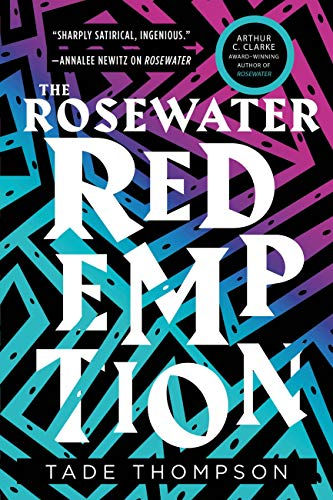
Imagine that right in the middle of Amos Tutuola's (or Chimamanda Ngozi Adichie's, if you prefer) novel, some mysterious alien entity lands and takes root - incomprehensible and unpredictable. This essence avoids direct contact with people, gradually entering into symbiosis with them and thus step by step changing the Nigerian reality, already quite exotic for a European reader, to suit its even more exotic needs. If you can imagine this picture, you can assume that you have a good idea of the setting of Rosewater, which lies at the intersection of the great Nigerian literary tradition (of which the Anglo-Nigerian novelist Thade Thompson is no doubt a part) and classic science fiction.
Tade Thompson is a British born Yoruba psychiatrist who is best known for his science fiction novels.
Rosewater is the name of a city that has grown up around an impenetrable alien dome that once bulged out in the middle of the Nigerian savannah. The dome provides a generous supply of electricity to its human neighbors, and once a year a hole is briefly formed in it, from which a substance flies out, healing the crippled and, much less pleasantly, bringing the dead back from the graves. In addition, so-called sensitives are born in the vicinity of the dome from time to time - people endowed with abilities that in another era would be called paranormal or psychic.
The protagonist of the novel Kaaro is one of them. During the day, he works in the security service of the bank and is responsible for protecting it from attacks by other sensitives. However, this work is just a cover: in fact, Kaaro is an employee of the secret intelligence service, using his unique abilities for their own (not always humanistic and noble) goals. One day, Kaaro receives a task that is most directly related to his own destiny: someone (or something) is consistently destroying other sensitives, and it seems that their deaths are connected with the very dome to which they owe their mysterious gift.
In the retelling of Thade Thompson's novel, alas, it looks much more logical and harmonious than in reality. The narrative in Rosewater is non-linear - almost half of the text is occupied by lengthy and somewhat confused flashbacks telling about Kaaro's rebellious youth, about his previous professional achievements and failures, sometimes related to the main plot, and sometimes connected with it only tangentially. As a result, there is disappointingly little space left for the actual development of the intrigue, some lines are cut off, some are resolved with a tedious patter, and some refer to the second and third parts of the cycle (like The Opium War, Rosewater - the first volume of the announced trilogy).
However, the plot flaws are more than offset by the merits of the novel, the most important of which is the already mentioned setting. Tade Thompson chooses a risky, but in his case extremely effective strategy: without explaining or commenting on anything, leaving the reader to guess for himself what is common for today's Nigeria, what is possible at the level of assumption, and what arose as a result of the penetration of an alien mind, he constructs reality at the same time compelling and excitingly layered. To match the novel surroundings, the hero is complex, deliberately devoid of everything heroic, almost repulsive, but for all that (and despite his unusual abilities) amazingly lively, humane and charming.
However, it would be unfair to reduce Rosewater to a banal fantastic attraction in outlandish scenery. Thompson introduces new - and very non-trivial - features into the plot of the creeping invasion, which has been repeatedly run in both literature and cinema. So, in his version, aliens do not represent a homogeneous mass, as is usually the case, but they have multidirectional (though equally incomprehensible to humans) aspirations. Similarly, the human reaction to their presence is not reduced to the poles of resistance or collaborationism, which makes Rosewater a text, if not realistic (in relation to science fiction, this word is always an exaggeration), then at least original and psychologically reliable. If you read Rosewater as a text about colonization, where the place of white oppressors is taken by people from another universe (or, rather, where two consecutive and equally traumatic colonizations overlap), then a third and fourth bottom will open in it.
This article was sponsored by Venkata Naveen Bhogaraju
Comments